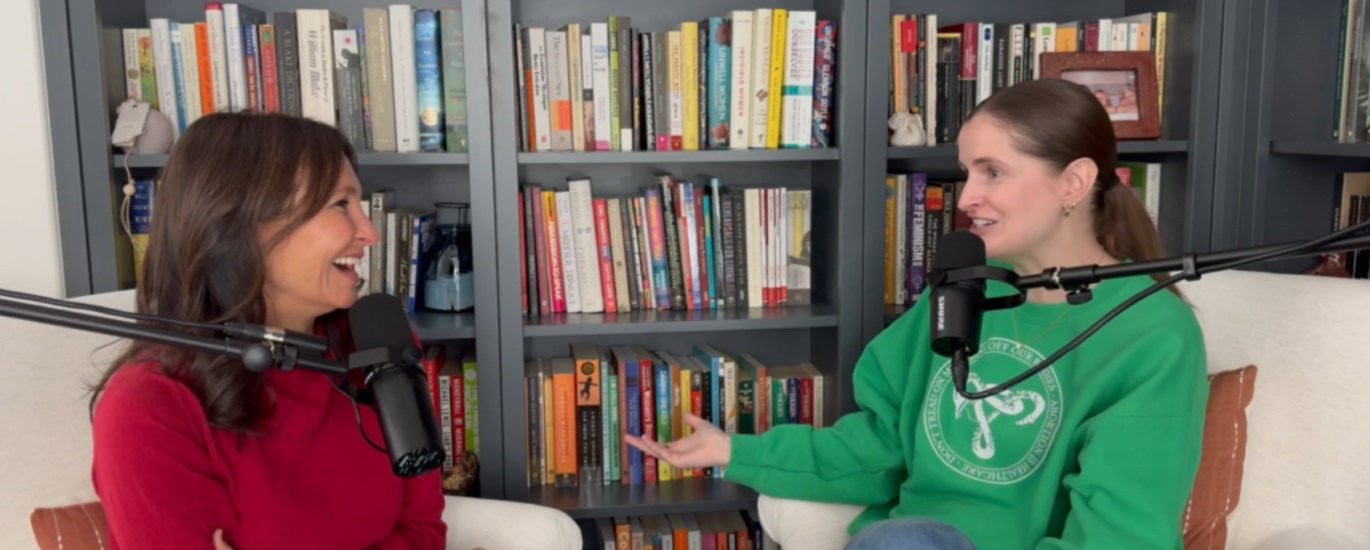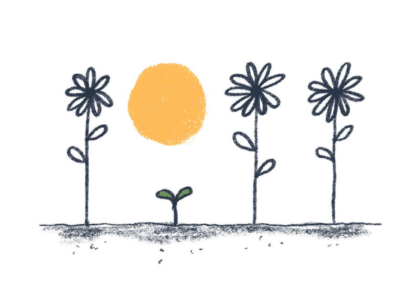“I will start saying the things that I wish other people would say”
Amy is joined by influencer Rosie Card for a riveting conversation about her career as a businesswoman, Temple clothes and contradictions, and the LDS Church’s untapped potential for radical change.
Our Guest
Rosie Card
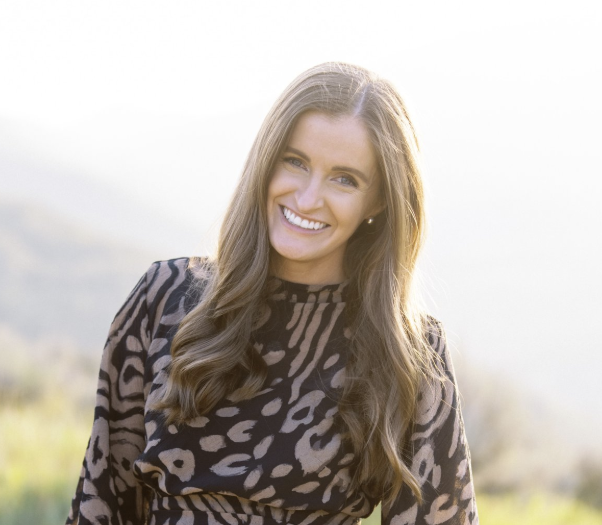
Rosemary Card is an entrepreneur, author and passionate advocate for women’s rights, inclusion and nuanced cultural conversations. She is the founder of Q.Noor and Card Wear and author of “Model Mormon” and “House of Light.” She firmly believes in the power of education and open conversation to bridge divides and promote understanding. She lives in Salt Lake with her husband, 2-year-old son, and two dogs.
The Discussion
Amy Allebest: When our family moved to Utah in 2020 from the Bay Area in California, we were a little bit apprehensive. We were moving from a blue state to a red state. We were moving from a very multicultural and pluralistic community to a place that we knew would be quite a bit more homogenous in many, many ways. And we were a little nervous. But I found that when we arrived I started meeting women who were incredibly educated and egalitarian in their thinking. And I kept noticing that a name would come up in conversation when people would talk about reproductive rights, and maybe this woman was kind of new to the conversation. She would say, “Oh, I learned this from Rosie Card.” Or when something would come up in conversation around immigration or in all kinds of different political topics, people kept mentioning Rosie Card. “There’s this initiative from Rosie Card.” And I thought, “Who is this Rosie Card woman?” Including sometimes there would be this really cute craft, also Rosie Card. So I was so excited to figure out who this woman was who was exerting so much influence in this culture in a way that I really, really appreciated. I discovered Rosie Card’s Instagram account and followed it, and I’ve been a huge fan ever since. And I am so excited to welcome to the podcast today, the one and only, Rosie Card.
Rosie Card: That’s so nice. That is so nice.
AA: It’s really true. And we moved here around a Senate election too, and that was really where it came out a lot. There was a very problematic Utah Senator, and I got a sticker from this website and there was all kinds of really cool merch, funny, kind of tongue in cheek merch, but for very serious initiatives. And that was you.
RC: Oh, that’s so nice of you. Thank you.
AA: So, yes, I’m really excited to have this conversation. I’ll frame this to my beginning of being acquainted with your work to the past, I think, two weeks ago you just published an article in The Salt Lake Tribune. So those are kind of the bookends of my familiarity with your work, and I’d love to cover both of those and everything in between.
RC: Yeah, happy to share.
AA: Let’s start by having you introduce us to you, where you were born, where you grew up, and the influences along your way that led you to do the work that you do now.
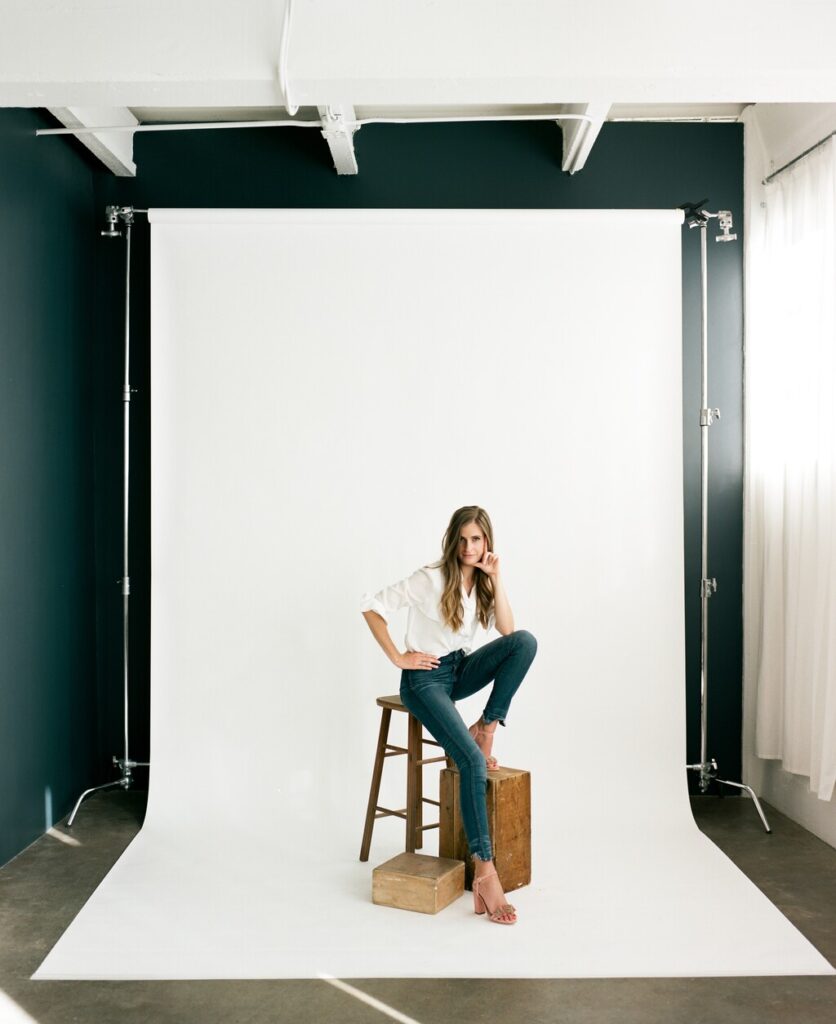
RC: So, I was born here in Salt Lake City, Utah, lived here until I was eight, then my family moved to New York so my mom could further her education in Manhattan and we lived there for four years. So then we came back to Utah when I was 12, and was here for a few years. And then when I was 16, I moved back to New York but would kind of bounce around for a bit working as a model. And then I came back to Utah, went to school, served a mission for the LDS Church, and have been in Utah for the most part ever since.
AA: Okay, that’s interesting. How would you say that each of those factors contributed to forming the person that you became eventually in adulthood? Maybe Utah, maybe the LDS church, maybe modeling in New York. How did that influence you?
RC: I think so many different opportunities for different exposure to things that were different from my cultural norm. Probably first and foremost moving our family to the other side of the country for my mom’s education was a big one. Going from living in Sandy, Utah as a little kid to several different little villages in New York was very, very different and gave me exposure to different types of people and families, and just life in general. And then modeling as well. I was able to travel around the world and work with people that I never dreamed of working with or having exposure to. So I look back on my childhood, and my family, we like to laugh that I went to 13 schools by the time I graduated from high school.
AA: Wow.
RC: So we moved a lot. And while there are probably some elements of that that have been difficult and, you know, things that I worked through in therapy, there were also some really great opportunities. But at the same time, still being in a very conservative family, part of a very conservative religion. And there were some, I don’t want to say contradictions, but I was raised by a very conservative mom who also worked my entire childhood. And my sisters and I, there are five girls, we all have had little businesses since we were 13-14 years old. So it’s this interesting dynamic that felt like we were very traditional, but then also doing some things outside of the norm for our community at the same time.
AA: Yeah, that’s really interesting.
RC: So yeah, I feel like all of those things had some big effects on me. Probably one of the largest effects on me was while I was modeling, I spent a three-month period when I was 17 living with my agent and his boyfriend. And I had had very little exposure to the queer community at all, so that really opened my eyes. And to this day, those two men are so near and dear to my heart and good friends and trusted people that I know I can go to and I feel like that friendship and that connection has had a huge impact on my entire life.
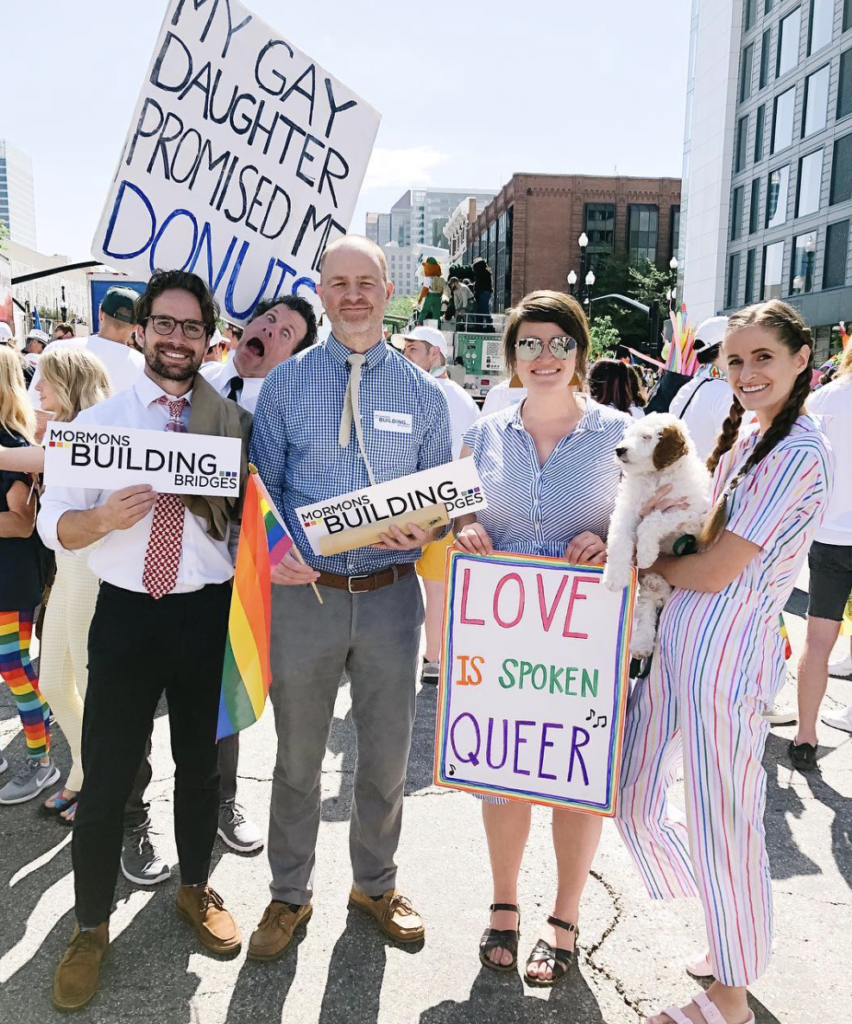
AA: Wow. Another option that I was maybe going to use for the intro was another avenue where I heard your name. I was walking through a house pretty soon after we moved here and I saw this print from J. Kirk Richards that’s called We Have a Rainbow House, and I stopped in my tracks and just started weeping. It’s this painting of a family with their arms around each other and it’s painted in a rainbow, so you see it and you know immediately that’s a household where one of the members is queer in that household and everybody’s circling. And I looked online like, where can I find this print? And I found it through this website called Q.Noor, and I ordered it and we have it in our house.
RC: Oh, that’s so sweet.
AA: But I was looking at like, “That’s an interesting name, Q.Noor,” it reminded me of Queen Noor in Jordan. Is that what it is?
RC: Well, when I was naming my company Q.Noor, Queen Noor, since I was in my early twenties, has always been someone that I love and admire and look up to. But I knew, I was like, “I can’t name a company after this person.” But I love the name Noor, which is the Arabic word for light. And my mom, growing up, taught us that going to the temple was where she learned how to be a queen. That was how I grew up learning about it. So to me, Q.Noor means Queen of Light, which I felt was fitting with the temple and kind of a nod to this woman that I love and something that my mom, a woman that I love, taught me.
AA: That’s amazing. Well, maybe we’ll use this as a portal into some bigger issues because I thought it was so striking and surprising that this website where I bought We Have a Rainbow House, which is very queer affirming, also sold temple clothes. And I didn’t put it together actually for a while that the Rosie Card I was hearing about with all the political activism and then all the other stuff, that you owned that also. So maybe that can be our way in to discuss some of the– I was going to say contradictions and they are contradictions, but the many issues.
RC: To have a pride section of a website that supports clothing for a place where LGBTQ people are not fully accepted, it’s a bit of a contradiction. It is. And as I look back at my life, I just think I’ve gotten really comfortable with the contradictions. And not that I don’t respect them, but I embrace that I don’t think there is life without contradictions, and I try to hold them and respect them and always be open to education and improvement. Yeah, I mean, we can talk about all of that.
AA: Yeah. So really quickly before we go on, can you acquaint listeners who aren’t familiar with the LDS temple, what’s the difference between a temple and a church? What do you mean by temple dresses? And people also might be curious about Mormon underwear. So if you’re comfortable just defining what that means.
RC: Yeah, totally.
AA: Okay, great.
RC: The temple is a house of worship that you don’t attend for your normal Sunday meetings. It’s a place where people go throughout the week for the highest form of LDS worship and the opportunity to be closest to God within the LDS church. And while you are in the temple, there’s a big emphasis on purity and that everyone is essentially on the same level. There’s a strict dress code for temple attendants. It’s all white, extremely modest, very simple, basic. Women wear a long-sleeve shirt or full length dresses. And for decades, they have just been like starchy polyester, so I thought, like, there’s a lot of really modest, basic design in quality fabrics that we could bring in to make them more comfortable. And then as far as Mormon underwear, Mormons who have attended the temple wear what they refer to as the garment, which is like a t-shirt and bike short set-up that they wear as a remembrance of promises that they’ve made to God to live their life in a certain way. Very similar to what a priest or people of all different types of faith wear, but Mormons just wear it underneath their clothing, rather than on the outside.
AA: This is fascinating. Okay, so you’re an influencer. How did that start? And you could talk about Q.Noor too, being a business owner. How have you done the work that you’ve done? Walk us through the timeline.
I don’t think there is life without contradictions, and I try to hold them and respect them and always be open to education
RC: Yeah, so I studied broadcast journalism at BYU, and I wanted to work at the church. So while I was a student at BYU, I worked for Bonneville Communications, which is the church’s advertising firm, and I worked on the I’m a Mormon campaign. And then that job helped me get this job at the church where I worked on a team that supported the 12 apostles on their travels around the world and was recording their speaking, kind of like maintaining a modern day book of Acts. While I was working there, it’s very funny looking back now and knowing all that we know, but there was a point where the church decided to move a significant number of their lower level employees to a company that they started, essentially that would enable them to maintain employees without having to pay health insurance. Part of that process of moving to this kind of outside employer, they had to cut down the amount of hours that you’re working, so you could work just under full time. And I was supporting myself, a single individual, so I needed to work full time. So I went to the temple to pray. And I was shooting people’s wedding photos and family photos, so I was like, should I just try to rough that up? What can I do to get more financial stability in my life since this job change?
And I had this idea to start making temple dresses, simply because there weren’t a lot of good options available. And the temple has been a huge part of my life and I wanted women to feel comfortable in the temple. And I know that there is science behind that if you’re focused on what you look like, you’re less able to learn. And that’s a big reason why school uniforms are what they are and all that kind of stuff. So, I thought, if women are actually comfortable in their temple dresses, maybe they could focus better and get more out of the temple and feel more comfortable attending. So I started this company, Q.Noor, and this was in 2015. And as I was trying to share it online and through social media, back then it was a very different landscape and no one was really openly talking about their faith in the way that we have influencers who are focused on being Mormon women. Those accounts didn’t exist back then. And understandably, a lot of the influencers that did exist were extremely uncomfortable with sharing a temple dress company. So it was really hard to navigate, and ultimately I decided, “I need to make myself an influencer because I need to get this out there.” So as part of Q.Noor’s Instagram account, I started to have conversations because I was sick of saying, “I wish someone would talk about this.” And I thought, “Well, I’ll start talking about it.” And it was hugely successful for the account. So the way that I kind of made myself into an influencer is I just migrated those conversations that I was hosting on Q.Noor’s account over to my personal account.
So yeah, it started out with just talking about, “Let’s stop judging each other for garments.” Super basic. Or, “Maybe we should focus on other things with the beehives than plan your future wedding.” Stuff like that. I felt like so many people felt that way and it maybe just needed to be said out loud that people would be like, “Oh yeah, I’m not crazy for thinking this. We could improve this.” And it was really, really successful and people really loved it. It did get really, really difficult because it angered a lot of people on the two extremes of the horseshoe, essentially, that end up being very close to each other. Yeah, that’s how it started. And ultimately the root of it was this feeling of being so tired of looking at these big accounts that I think, like, “Wow, they have so much opportunity to influence for good” and it felt so disappointing to me. And of course, I don’t know anyone’s life and what’s going on. And it’s, again, this contradiction of me wanting these big accounts to do more with the potential that they have, but also understanding that I have no idea what’s going on behind the scenes. So I just thought, “Well, I will start saying the things that I wish other people would say.”
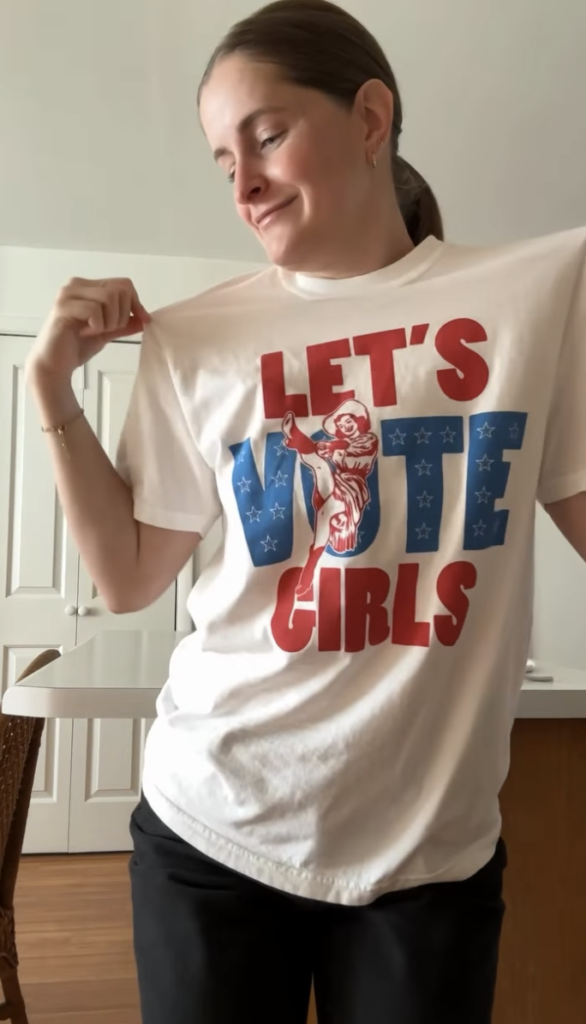
AA: I love that so much.
RC: And it just grew from there.
AA: So you’re taking these conversations that you’re having, it sounds like kind of religious conversations, right? About the temple because it’s Q.Noor, it’s the temple dresses and stuff. You started a social media account. Was it on Instagram at the very beginning?
RC: Yeah. Q.Noor had an Instagram account from the very beginning and I just had an Instagram account, just like everyone did, starting in like 2011, you know? Posting Skittles and the most random stuff with heavy, heavy filters.
AA: That’s awesome.
RC: Just like anyone else.
AA: Perfect. Love it. And then you started having these conversations, like you said, you’re talking about things that you wish other people would talk about. You’re like, “I guess I’ll be the one. I’ll talk about it.” At what point did you start expanding into political topics and why? And was that very organic for you? Have you always been politically minded and active or was that a new thing for you?
RC: That was a new thing for me. But in my mind, it was always because the way that I was a Mormon or a member of the Church of Jesus Christ of Latter day Saints was, I describe it like my life is kind of like a tapestry and the Mormon thread touched every single other thread. It was so intricately a part of my life. So when I’m talking about like LGBTQ rights, women’s rights, to me, those things weren’t like a political topic, that was also all a part of it. Because I see it as being kind to others and treating others with respect, and that to me is so fundamental to the teachings of Jesus Christ and my Mormon faith that I didn’t, it didn’t feel like I was opening a new chapter. It felt like the obvious thing for me to do. I have, like everyone, loved ones who are LGBTQ, and it has always felt like a no-brainer. I look at what their life experiences have been and some of the difficult things they’ve faced, and I just think like, I’m so privileged in the sense that I haven’t had to have that element of difficulty in my life. For sure my own, but not that specific one, and the very least that I can do is try to help them. Yeah, so it just has always felt like I was approaching it from a place of faith and that doing that was authentic to my faith.
AA: So, using the tapestry analogy. If you pull on that thread, and I’m a hundred percent with you, that’s the Jesus Christ that I was raised to know. And yet, knotted with those threads, if you pull on them, comes all of the statements from church leadership that condemn queer life, basically, and you get racism, and you get patriarchy, and you get all kinds of other things that conflict. How did you handle that?
RC: Well, this kind of tapestry analogy, I think because I’ve gotten more into fiber arts and sewing recently, it’s what has been, as my life has gone through some pretty big changes in the last couple of years, it’s just been in the forefront of my mind. And the way I talk about it is that as I look at my tapestry, I realize that there are certain threads that I do not like. First and foremost, patriarchy. And as I’ve been pulling that, I think I thought that I could work that thread out and that I could maintain all of the rest of it. But as I’ve pulled it, the truth is that it’s all unraveled and it’s a bit of a mess. And as I’m kind of sorting through this massive pile of fiber and thread, it is a unique opportunity for me to be able to say, “Okay, what are the parts that I like, and what are the things that I actually believe? And what things did I think were fine, but patriarchy has really destroyed this other thing, and I don’t want that either.” And it at times can feel overwhelming, but right now it just feels so exciting to me. It feels so happy and so positive and so, like, I get to decide what is in my tapestry. And as a child growing up in a strict religion, you don’t get to make all your choices. And I think probably in anyone’s life, you don’t. You’re just a kid and you get what you get.
But I’ve now reached a point where I get to decide and I will spend the rest of my life for sure, deciding and weaving and unweaving and messing with it. But to me, it feels so hopeful and so exciting and so positive. And I just feel immensely, immensely grateful. But I keep saying to my therapist, “I’m shocked that this happened!” I was so sure. I was so sure that I could just say, because I do disagree deeply with a lot that the prophets and apostles, the leaders of the LDS church, things that they have said. I fundamentally believe that they don’t even align with the teachings of Jesus Christ. And I thought that I could keep living the gospel of Jesus Christ that was taught to me through Mormonism and kind of just make that distinction. But yeah, I’m shocked by this process. Because so much of Mormonism is set up in the standpoint of like, “If you believe A, then you believe all the way to Z.” And it’s interesting how the reverse works as well. If you don’t believe A, then you do kind of question it all. And sometimes that’s overwhelming. My parents are on a mission right now for the Mormon church, and my dad, recently I was talking to him about a hard thing I’m going through, and he said, “Do you pray?” And I just said, “I don’t know.” I am re-addressing everything. And sometimes that feels overwhelming, but also I don’t feel this pressure to have it all figured out. And I’m okay with saying, “I don’t know, sometimes maybe, sometimes not, maybe in a new way. I don’t know.” And that’s okay.
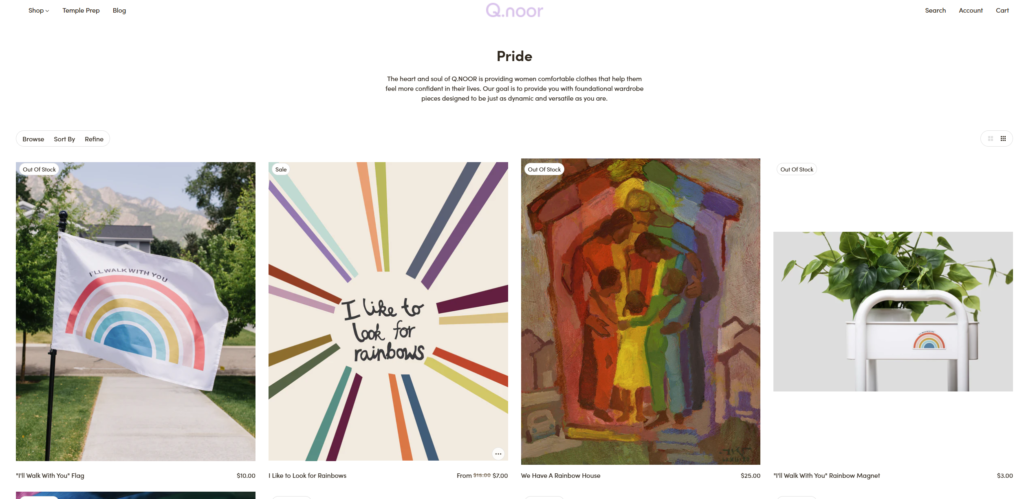
AA: That is okay. I love that. Well, Rosie can see that I’m maybe weeping a little bit, just talking about the tapestry and having it all unravel. I’m so glad that you described your journey a little bit and talked about also that experience of that religious thread, for us, it’s throughout the whole thing. There isn’t any way to compartmentalize another aspect of your life. It’s everywhere. And so that experience of trying to wiggle one thing out and having the whole thing unravel is so painful. And then to have you say “It’s…” and I was waiting for the adjective and you said “exciting,” and that kind of released the tears also because I actually needed to hear that. And I’m also okay, I would say that the vast majority of the days that I go through my life, I’ve settled in a beautiful place, I feel on solid ground. I’ve gone through the transitions that I’ve gone through. And it’s a work in progress, always in life, but I’m pretty much in a really good settled place. But remembering what that unraveling felt like and then remembering to have hope and remembering how exciting it is to be able to choose and to own that sovereignty in adulthood and say, “And starting now, I choose what I weave in.” That’s wonderful. What a refreshing and hopeful, optimistic way of looking at things.
RC: Yeah. I feel really, really lucky. And I’m so lucky that I am surrounded by, you know, I have a husband who supports me through all of that. Not that it’s been smooth sailing always with my family and loved ones, but we’ve reached a really healthy place. And I think there are a lot of things that people experience when they are going through this unraveling phase that make it anything but exciting, right? It’s so hard. So I don’t want to diminish that. And one thing that I’m really proud of myself for is doing this in my own way and on my own timetable, which has been difficult because of the more public nature of my life. There have been extremely difficult things that I’ve experienced, I just experience them before, where I feel like a lot of people might say they make an announcement and then they make it this huge process. Where I think most people who look at me or were kind of like, “Oh, yeah, that makes sense.” And whenever I reached out to my sisters and let them know, they were all like, “Yeah, you didn’t need to make an announcement. We know.” So it has been kind of a different path. And I don’t want to diminish the hard things that you experience through this, but just the way that it’s unfolded for me, the place that I’m personally at right now, it does feel very peaceful and very happy. And you mentioned that I wrote a piece for the Tribune and I didn’t realize how much weight would feel lifted by writing that and publishing that in such a public manner. So, it’s been a great two weeks since it was out.
AA: Wonderful. Well, let’s get back to that in a few minutes. First, I want to back up a little bit and talk about, because we started talking about the religious aspect because it’s all very much integrated with the political. The religious, the political in a complicated way, but it’s all kind of part of the same stuff. So tell us what specific initiatives or what topics that you’ve been tackling. And maybe we can even start with your sweatshirt. Do you want to describe to listeners what sweatshirt you’re wearing?
RC: I’m just wearing a sweatshirt that is green and it has a kind of seal or an emblem on it that has a snake in the shape of a uterus. And it says, “Don’t tread on me, bans off our bodies, abortion is healthcare.” And it’s part of a collection by another company that I launched called Card Wear. It would have been just a couple months after we lost Roe, and it’s green because that is kind of the traditional color for women’s rights and the pro-choice movements. And we were able to raise money for a bunch of organizations that support women’s healthcare, and that is definitely like a topic that I’m really passionate about, and talk a lot about LGBTQ rights. And as far as the pro-choice element, I became passionate about it, and I grew up obviously in a conservative home, I thought abortion was baby killing, and it just seemed like, “Oh yeah, that’s bad, so why would anyone want that?” That’s probably the extent of my thought that I gave to it. And then during Trump’s first campaign, I saw on Facebook a woman sharing her experience. She was an LDS woman in Utah having pregnancy complications for a very much wanted child but ultimately it came down to either she would live or she would carry this pregnancy to term. And she wrote about what it was like to not be able to make that choice for herself and to have a board of strangers who would go home after making her life and death decision, deliberate, and then let her know what they decided. And that was the first time that I’d ever even heard that someone might need an abortion for a baby that they desperately want. And that just blew up this little perfect idea that I thought I had about abortion = bad. And I realized that it’s so much more nuanced. And then the more that I dug into it and read and looked for women’s stories and learned about it, I just was like, “Oh, we’ve got it all wrong. This is all wrong.”
So I just started sharing what I had learned on social media, and that was honestly one topic that I always vowed, like, I will never talk about abortion online because it just felt impossible and so terrifying and that it would only have negative effects on my life and on my business. But again it came down to, it felt like I have this platform, I have this knowledge, I just feel like I have a responsibility to share it. And this woman was so brave to share her story and it had a huge influence on me, so I should be brave to share my learning experience. And that just blew up in the most incredible, positive way. So I started sharing about that during, it would have been the 2020 campaign, so Biden’s campaign. And now today I’m on the board of Planned Parenthood Utah, and it’s been quite a journey. And whenever this topic comes up, people are so uncomfortable with it. But I think about a man that I work with and he was telling me, “I know you’re really passionate about this.” And he was like, “I’m pro life, but I believe blah, blah, blah.” And I was like, “Let me hold your hand when I say this. You’re pro-choice. That is pro-choice.” “Oh, no, no, no. I’m pro-life.” I was like, “What you just explained is pro-choice.” And it’s hard for people, I think, sometimes to accept that. But at the root of it, I think, well, we know that the vast majority of Americans believe that women should have the choice of what to do with their own bodies and that they don’t want the government in their doctor’s offices and that people should be able to make their own medical decisions. And I’m all about shining light on things that people think are scary, and then when you shine the light on it, it’s like, “Oh, that’s actually not scary at all. I’m very comfortable with that, and it’s okay.” And just kind of taking the boogeyman out of it all.
the vast majority of Americans believe that women should have the choice of what to do with their own bodies
AA: Yeah. So, how do you handle when you do get pushback? Because I’m sure you do, and you were initially worried to talk about reproductive rights online, and that is not an unfounded fear. It can get ugly and explosive. So how do you handle it?
RC: I’ve been having these conversations online for about 10 years. And I’ve learned a lot, and my comfort level has adjusted a lot, and I also think that what people expect from me has kind of adjusted. In the beginning I received a lot more pushback because people were extremely upset that I was, at that point, a very active LDS woman, and then talking about these things that did not fit their idea of what a good Mormon woman was. So there was a large reaction to it. But as I’ve continued going, I think people have accepted it and it’s just become more normalized. It’s a lot more common to see women of all different faiths and engagement levels in a faith talking about various topics. So people are just more comfortable with it, and people know that I am not going to tolerate certain things. It’s common to see on Instagram if someone is sharing a mean DM that they got, they will blur out the name and block the picture. And I tell people like, “I don’t guarantee you that privacy. If you send me something rude or extremely hurtful, you better be ready to have so many people that you know know that you send those kinds of DMs. Because I will share that and I don’t give you privacy. I don’t protect you.” So it only took doing that probably three times, and, I kid you not, the amount of rude DMs probably dropped by 95%.
AA: Amazing.
RC: So, I really don’t deal with that anymore. And when I released this recent article with the Tribune, people were really worried. Like, “How is it?” And I was like, “I’ve only had positive responses.” I think part of it is because people know that there will be a level of accountability with their engagements with me and they adjust their choices accordingly.
AA: I love it! You teach people how to treat you, as they say, right?
RC: Yeah, I do not feel like I owe anyone who’s going to treat me poorly. Of course, I’m not interested in stooping to anyone’s level, but I do believe in accountability. You never know if you’re going to get your DM shared and I think that unknownness is in my favor.
AA: That’s so great. Aside from people who will maybe throw punches online, did you ever have to go through a process of just not caring what people think, even if they don’t say it, just knowing that people are judging you? Because I know that that’s hard for a lot of people, and especially a lot of women. I know a lot of women who admire women who speak out, but don’t feel that they personally could. Do you have advice for women in that position? The kind of thing where, you know how in church, sometimes in years past, if I were to give a talk in church that was maybe progressive or questioning some things, no one would say anything to me at church. Maybe I’d get a little whisper, like, “I’m so grateful you said that,” or emails afterwards or texts like, “I’m so grateful you said that. I could never say that.” How can people start saying it?
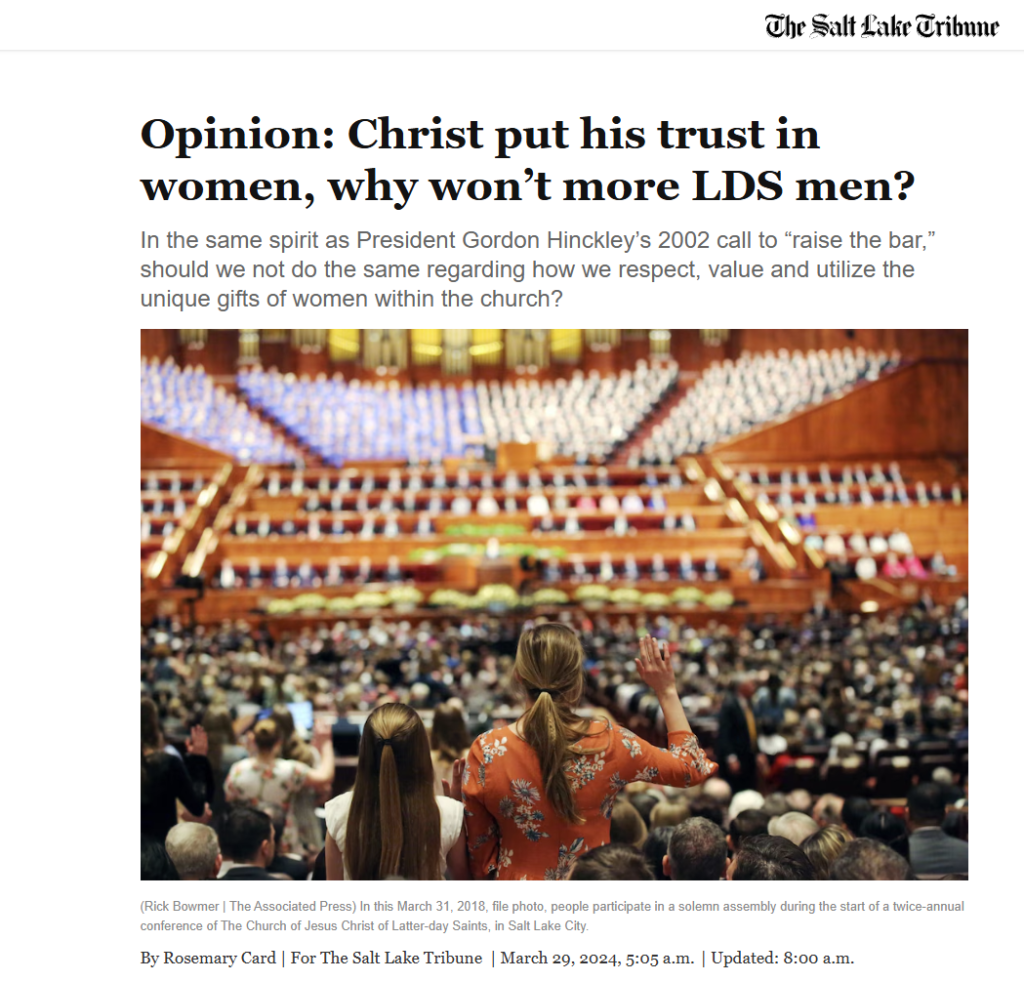
RC: Oh man. Well, it’s so funny, I just started listening to this book from the bishop who boldly spoke to Trump.
AA: Oh, yes.
RC: But she has this book called How to Be Brave.
AA: Oh, I gotta get it.
RC: I just started listening to it, I’m like, “This is so perfect.” And talk about someone being so brave. I would think about the times where I so desperately needed someone to speak up for me, and just personal life experiences where it would have meant the world to have someone advocate for me and what it felt like to not, or what it felt like when someone did. And just thinking, you know, my grandma always taught my mom this thing about like, if you’re ever at a party and you feel nervous, find someone who you think is more nervous than you and try to make them feel comfortable. And I have really taken that to heart in hopes that putting that good energy out in the universe that way, that someday when I need someone to advocate for me, I want to be sure that I’ve taken opportunities to advocate for others and be that person that I would wish someone would be in my life. I don’t know if that’s beneficial to other people to consider, but I just think it comes with practice.
There’s a tenet of the Mormon faith that is this belief in a heavenly mother but it’s not openly and not often talked about. In fact, growing up it kind of felt like if you’re going to talk about it you say it in a hushed tone and I realized that the more I started talking about her the less uncomfortable it got, and now I don’t think twice about it. The same thing with saying the word “abortion” or whatever, you build that muscle and you get more comfortable. And as far as being worried about what other people think, I don’t know if that ever really goes away. I think I just have gotten more comfortable with knowing that I am not for everyone. And also knowing that so much of what other people feel about me has so little to do with me. When I was a very progressive Mormon on the internet, there were a lot of people on both sides that were really upset with it, and it was really good for me to reach the point where I realized that this isn’t about me. They want to feel confident in their own choice, so they want validation in that. So me being like them or making the same choices would feel very validating to them, but I can’t. I have to be me. I can’t be that for them. And as much as that might bother them, I have to let them deal with that with their therapist on their own time. I’ve got my own things I need to deal with and sort through. So I just think it can be really uncomfortable to be making choices that are different from the norm, no matter what those are. And a lot of people, I think it’s so normal to want validation and to feel like other people are making the same choice so that we can tell ourselves, “Oh, I did the right thing.” But we just have to be able to own that ourselves and know that we are good just doing what’s true to ourselves.
AA: Hear, hear. One thing that I want to dig into is how integrated your work is and how it seems like every day there might be a post, if you scroll through your Instagram account, which I highly recommend for listeners who haven’t heard of Rosie Card. Go to her Instagram. But you’ll see things like, “Here I am gardening… here I am making a craft with my child… here I am at a rally, or making a sticker that supports queer rights.” It’s all part of living life. And you, specifically, I think sometimes say that living life as a woman, it’s all of these varied interests and facets and these are different talents. And I just love the everydayness of it because I think that sometimes people do compartmentalize or they think of it as this big scary thing they’re going to have to sign up a ton of their time and a ton of their energy and there’s this big learning curve, and “maybe I’ll make a mistake and it will be terrible.” And you just make it seem so accessible. So I wonder if you can talk about that a little bit, the content that you produce, and then maybe just touch on some of the other topics that you talk about politically. And especially because you do so much anti-patriarchal work, and there’s a lot of different aspects of that.
RC: Yeah, it’s hard to pinpoint how it all started. But as someone who is working online or being a content creator, there’s a huge emphasis on, like, “you need to have a niche, you need to have a niche, find your niche and focus on it.” And I do think there’s wisdom in that as far as algorithms and all that kind of stuff. There’s a reason why people say that. But I had such a hard time because I felt like, “but I care about all these things and I like all these things,” so I have a hard time. I’m just going to be me and I am just going through life. So depending on what’s happening in the world around me and my family, and just the world in general, different things come up. And we all have different exposure. And I was so lucky to spend a semester studying abroad in Jerusalem, so that gave me unique exposure to– not that one semester abroad makes me an expert on the Israeli-Palestinian conflict, but it was near and dear to my heart. And so I am going to share about my concern for the people of Gaza, and I’m also learning to quilt at the same time, so it just feels natural to me. It may be because of social media, kind of the point of my life that it came into my life that it’s natural to share. But I just think as women, our lives are so nuanced and we do have so many different opportunities and insights. And I think we’re teasing ourselves or we’re buying a lie if we think that no, our life is just this one thing. Whether it’s just involving the family or the home or children. I think our skills and the things that make us great parents or the things that make us great homemakers are also the same things that make us great organizers and advocates and allies. I think it’s all important. It’s all a part of it.
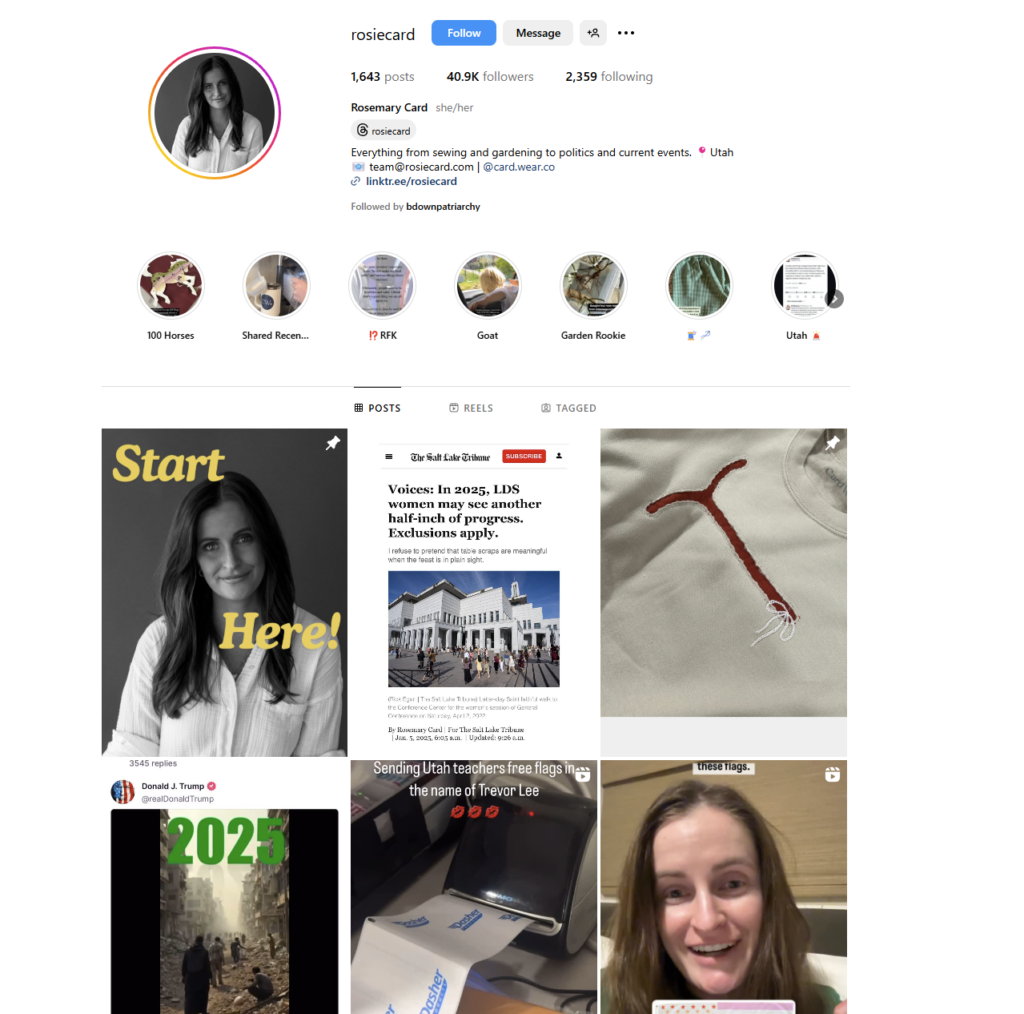
One thing that I’m really passionate about right now is women and finances, and I don’t even know how it popped up. I think someone might have DM’d me, a woman saying something about I might have referenced something about a credit card, and it came out through this conversation that she is an adult woman, married with children, but didn’t have credit. And because they’ve always used credit cards in her husband’s name and the loans were all in her husband’s name. So I was like, “Oh my gosh,” just being a single woman into my thirties, I knew how important my credit was for me and my ability to get business loans and home loans and car loans and all of that kind of stuff. So I then started sharing about it and realizing that a significant portion of my following feels extremely insecure in regards to finances. A lot of them feel really limited in their ability to make life choices that are best for themselves and their children because of their lack of access to finances and understanding. And then knowing things like how in the venture capital world, women get 2% of financing. And I was like, “Well, that’s crazy.” So I’m doing all I can right now to work with experts and research to create something very basic, like Finances 101, the most basic thing to help people dip their toe in because I know how overwhelming it is. So it just kind of evolves. And I’m sure once I get that product out there, I’ll find something else that I’m interested in. I love a problem that can be solved, and there are so many solvable problems. That’s a big thing for me in the Mormon church. I think that there are so many solvable problems, and leaving them unsolved is really hurting people in a very real way. So I think, why not fix this?
AA: I love it! I love it. All through this conversation, you’ve articulated that like, “Well, I looked around and nobody was doing it, so I guess I’ll do it.” I love that attitude and that willingness to just jump in. And yeah, the finances, ugh, that is coming up in my life so much with women I know. By not solving the problem, harm is done in that absence because in the meantime you have so many women who oftentimes find themselves divorced. This is the one that I’m seeing a lot, probably just because I’m in midlife and things are starting to fall apart for some people I know. And women are like, “I am no better off than my great-grandmother in terms of my autonomy and my ability to support myself and function as an adult in the world.” And it’s only then that they realize, “Oh crap, I’m–” I was going to say “destitute.”
RC: You can be left destitute. You absolutely can. And even if it’s just that your spouse dies and you weren’t on any of the loans and you have to go through probate. As I’ve been digging into it, I’ve realized that, okay, women have only been legally allowed to access things like credit cards for what, 50 years, since the ‘70s? So it’s understandable that even when that changed, when my grandma was an adult, that doesn’t mean that they all jumped on board, so that affected the education that my own mom received. And that, of course, affected my own education. But I was just reading this great book called A Room of One’s Own.
AA: By Virginia Woolf, of course!
RC: And I love how she’s like, “I’m going to be hard on you guys. You’ve had access to be able to have a job for ten years.”
AA: Yep, ten years.
RC: Ten years! And she was mad at them for not being accountable for ten years. And I just thought, oh my gosh, it’s been over a hundred years and for a lot of people, not enough has changed.
AA: Not enough has changed.
RC: I mean, obviously, everyone is so busy. I think about my peers and they are up to their eyeballs in childcare and working jobs and trying to survive in such a weird environment that we’re in right now. And they don’t have time to dive in and learn about the stock exchange. And I’m really lucky in the way that my professional career has gone, but I’ve been like, “Okay I can take one for the team and I can read all the books right now.” And not even that I’m doing this huge service, but for my job I have the luxury of being able to say that I’m going to learn as much as I can and get experts to partner with me so that I can hopefully take some of that overwhelming element and get this in a more digestible format. Because I feel like once you get your toes wet, that’s like the scariest part. Then you realize that it’s actually not that bad. A lot of times I think about the dumbest dude I know, and I’m like, “If he can do it, surely I can figure it out.” I’m capable.
AA: Oh, I love it. That’s so great. Well, we’ve arrived at kind of the end of the conversation, so I do want to dig into that Salt Lake Tribune article. And this might be a good way to explore some of the other gendered issues that we haven’t had a chance to talk about specifically yet. I thought it was incredibly brave, and especially in an environment where there is fear of not just people not liking you, but institutional repercussions. We both know of women who have been excommunicated for speaking out. And I don’t know if you had any of those worries at all, but I’d love you to talk about the main points of the article you wrote, why you decided to publish it, and what the reception’s been like.
A lot of times I think about the dumbest dude I know, and I’m like, “If he can do it, surely I can figure it out.”
RC: Yeah, totally. So just for background, the Tribune had me write a piece around Easter and they’re great about saying kind of write whatever you want, but around this topic. And I wrote about how Jesus trusted women to be his first witnesses, and how significant that is. And then kind of turning it to, why can’t the LDS church trust women to be standalone witnesses? And that was a successful piece for them, so they reached out to me in the fall of this year and said, would you be willing to write another piece at the end of the year? They’re very nice and gave me a heads-up, and the theme was my hopes for LDS women in 2025 or my predictions. And I spent months wrestling with it and literally days before the deadline in the middle of December I said to my husband, like, “I cannot get myself to put some positive piece together” and I felt like that’s– No one told me that that’s what they wanted, but that was just what I felt like I needed to do. And he just said to me “Well, then just be honest.” And the honest truth was I had, for the past four or five years, been going through this process of leaving and stepping away from the church. And for at least two years I had been kind of, I’d say like breadcrumbing or dropping it because I didn’t want to be inauthentic with my audience, but I also felt that I don’t owe anyone on the internet private details of my life. So again, this push-pull. But I was having a hard time. And I get so many nice DMs from people that say things like, “I’m so grateful for you. I’m able to stick in the church because you’re in the church.” Which is so sweet, but at a point when I’m not in the church. And so it really weighed hard on my heart.
I would also have people send me DMs and be like, “I need you to stop posting that you’re drinking coffee because I don’t care if you drink coffee, but I share you with my very conservative, very in-the-church people as kind of like a bridge for us. And if you’re posting that you’re drinking coffee, you can’t be a bridge for us.” And that was really hard for me because I wanted to be a bridge for people and I wanted to help, but I also need to be me and I need to be a person. So I felt like as much as I didn’t want to, that a more public statement was necessary. When I was trying to find a way to do it, and I’m really lucky that I have a wonderful, wonderful therapist who does not care one bit about religion in the slightest, but I would always say, “I don’t want to do this. I’m not ready to do this.” And she would say, “Don’t.” She never once pushed me. She just said, “If you even reach a point where you want to, you’ll know when that point comes, but you don’t have to. You don’t need to.” So, I feel like it just was the right time. And when my husband said that to me, to just be honest, I thought, “You know, this is actually probably a perfect opportunity for me to share the things that are really heavy on my heart.” And also kind of end with this bit of transparency that I no longer identify as an LDS woman, even though I don’t think that once you’ve been a Mormon, I don’t think you could ever un-Mormon yourself.
AA: In certain ways you can’t.
RC: Even though I know that Mormon women will always be a part of me and I will always be a Mormon woman, I am not an active participant or believer in the church. And I was really nervous about sending it off. This was right around Christmas, and I sent it off and I didn’t hear from my contact at the Tribune for a few days and I sent this embarrassing email that was like, “If it’s too much, just pretend like this never happened, don’t feel bad if it was too spicy.” She was like, “No, no, no, it’s just Christmas.” So yes, she was like, “It’s good, it’s fine.” But I was so grateful that it really resonated with women both in and outside of the church, that so many women who are active in the church were saying things like, “Yeah, why can’t we get more information about these things that have such huge impacts on our life?” The church has a whole handbook with opinions on everything from parking lots, like the official church’s rules on parking lots, to how they feel about women getting their tubes tied. They have opinions on everything. But we’re not able to get a little more information on when something as foundational to the faith as the promises that are made in the temple, when those change, we can’t get info on that? Just so many things that I think so many people struggle with. And it’s nice to have someone say it out loud because it feels like, “Oh yeah, I’m not crazy. That is really uncomfortable, and that is really confusing, and it is normal for me to have an adverse reaction to that. It’s not because I’m bad, that’s actually a normal reaction to what I’m experiencing.” I think everyone likes to know that they’re not alone in that.
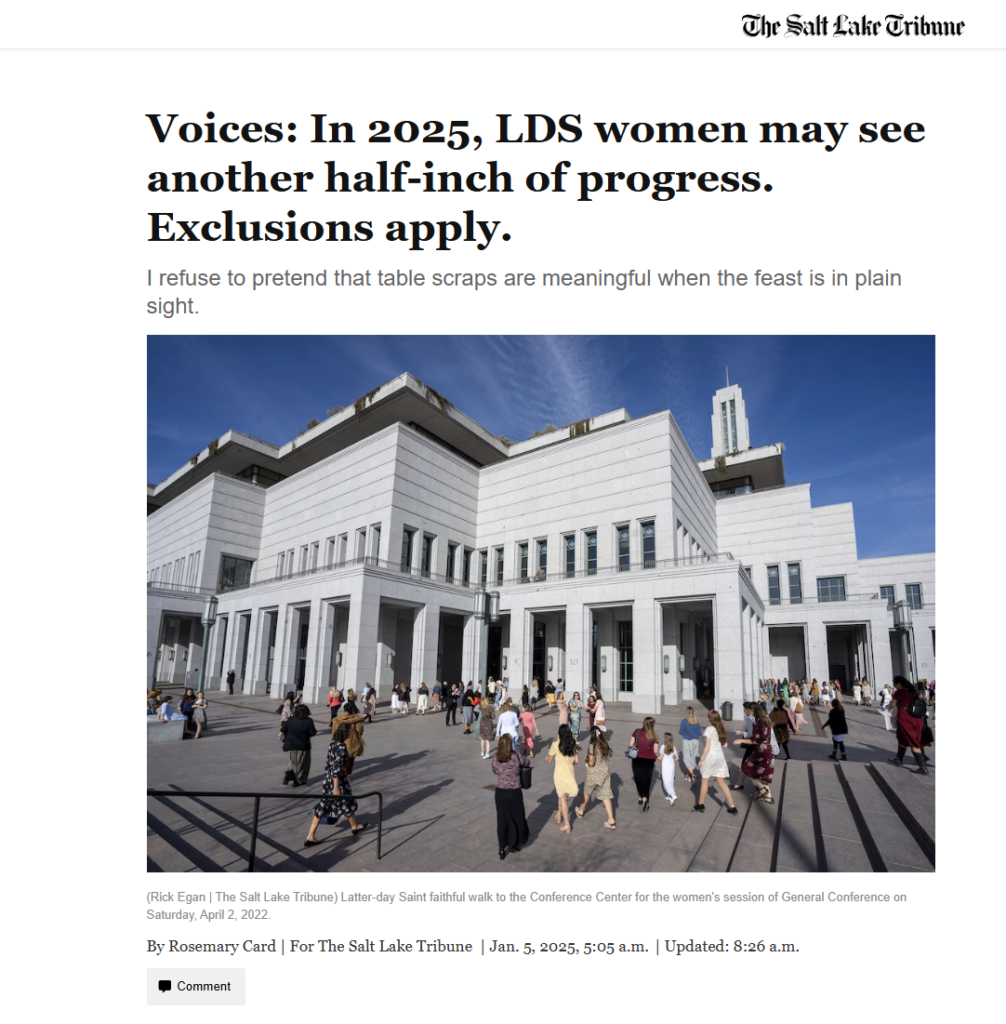
AA: Definitely true. I thought it was so bold also in advocating for a more radical, if you will, and when I say radical I mean the literal definition of “from the root.” Where you say that women in the LDS church might get a few more breadcrumbs this year. That is not enough for me. That is no longer enough for me. And I’m in the same place in my life, in the church and out of the church too, patriarchs benevolently bestowing little breadcrumbs and saying like, “Ooh, now aren’t you excited and grateful?”
RC: Change!
AA: Yes, change. Aren’t you thrilled? And having that be enough and putting lace on the curtains as a remodel in the room even though the whole building is rotten at its foundation. We need to address the bigger issues there. I so appreciated the boldness of that. Because it really, it’s starting to tick me off when I hear women be so excited about removing the two inches of the temple garment. Like, “We can wear extremely modest, slightly more, we can reveal this much more of our shoulders,” and women are like, “Aren’t we so grateful?” I can’t even, I can’t do it. It’s infuriating.
RC: I can’t pretend. No. I can’t pretend that that is meaningful anymore. And a common thing that you hear people say is the illusion that the church is a big ship, and it takes a long time for a big ship to turn, but I think the perfect example is when the church had the big name change, and that ship turned on a dime, right? It displayed that the church has the possibility to turn so quickly and in such a drastic way. I mean, they went from spending millions and millions and millions of dollars saying “Call us Mormon” to “That’s a win for Satan, do not call us Mormon,” offended overnight. So, I’m not buying anything.
AA: No!
RC: Anything can change. And honestly, I think that’s a tribute to the claim that the church is what it is. I’m thinking of an instance when I was working at the church and we were making a video that got denied because the woman, who’s an angel member of the church and that the video was centered around, was obese. And the feedback came that that is not the image that we want to present. And my boss so carefully fed that news to me because he knew it would absolutely send me. And I remember being in a meeting and people saying, “We have to remember that some element of the videos that we are making, it’s an advertising campaign, and this is very normal.” And I just said, “No. If we are what we claim that we are, if we are the church of Jesus Christ, then we absolutely need to be held to a higher standard. We need to show the world that we don’t need to subscribe to these ideas that people are only valuable if they fit a certain cookie cutter.” I was enraged. And I feel like there are so many ways that that is true. If we are what we are, we can operate on a higher level. And if we have the access to God that we claim to have, we can change things quickly. And we can better align things to the teachings of Jesus Christ quickly, and we can do it boldly, and we should be leading out, we should not be decades behind. And when we shrink that gap that we’re behind, we shouldn’t be cheering and celebrating. We’re still so behind. And I know that some people might look at that and be like, “Behind the world?” No, but just behind kind of basic decency in a lot of ways. I wasn’t planning on sharing that story, but–
AA: I love it. I’m so glad you did.
RC: It was devastating to see. And especially when there was a lot of content with men of all different body types.
AA: Oh, I bet. Oh my goodness.
RC: But that women, we didn’t want to show women who didn’t fit a certain mold.
AA: Yeah. Well, good for you for speaking up. And I don’t think it changed their decision, but at least you said something. Because a lot of times people will cry all the way home, they’ll talk to maybe their sisters about it, but they don’t say anything in the meeting, and I’m so glad you did. Well, I really recommend, for listeners who are interested, if you haven’t read the article in The Salt Lake Tribune, read it. It’s wonderful. It’s so well written, so inspiring. And again, check out all of Rosie’s work. And actually, can we end by you telling us all the different places that we can find your work?
RC: Yeah, I would say most of it is just on Instagram @rosiecard. Also, if you go to my Instagram there’s a link to a Substack that I’ve started and that’s kind of where I’m hoping to migrate a lot of my more in-depth stuff.
AA: Fantastic, I will do that right away.
RC: It’s called Philosophies of a Woman.
AA: The Philosophies of a Woman. Fantastic.
RC: Maybe a little scripture, who knows? We’ll see.
AA: I love it. Well, Rosie Card, thank you so much for being here today.
RC: Happy to be here. Thank you.
the things that make us great homemakers are also
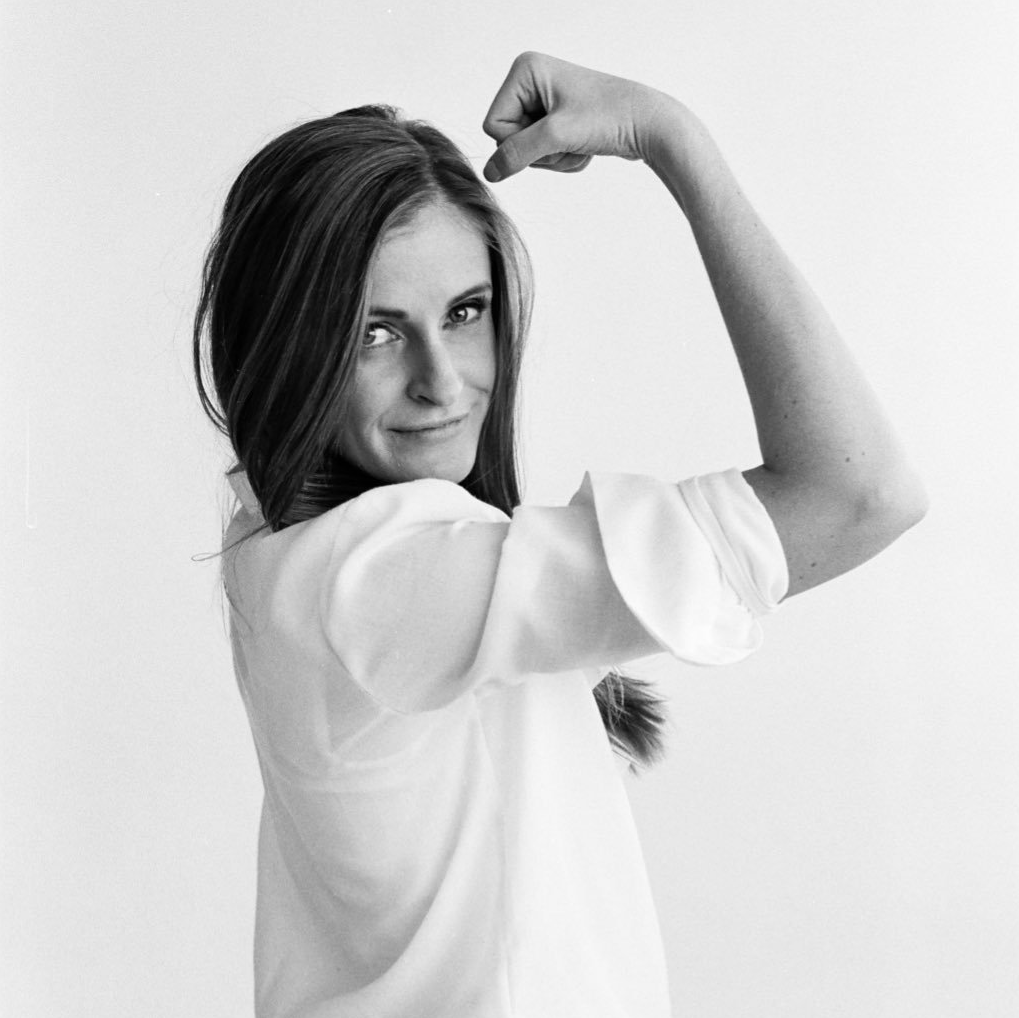
the same things that make us great organizers and advocates and allies
Listen to the Episode
&
Share your Comments with us below!

